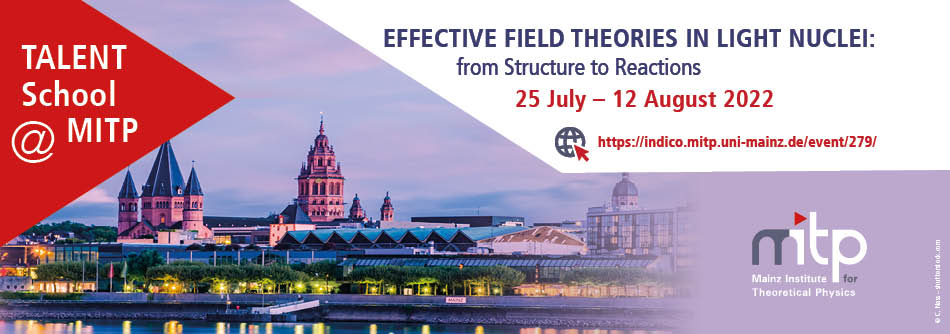Effective Field Theories (EFTs) play a growing role in nuclear physics. They provide a powerful framework to exploit a separation of scales in physical systems. They are widely used in many branches of physics ranging from condensed matter to nuclear and particle physics. In nuclear physics, EFTs have been naturally applied in various ways. For example a Chiral-EFT can be derived upon the spontaneously and explicitly broken chiral symmetries of quantum chromodynamics (QCD). It can help building effective nucleon-nucleon as well as three-nucleon interactions, which give rise to Hamiltonians well grounded in QCD. These Hamiltonian can then be used to study the structure of nuclei throughout the nuclear chart.
Another application of EFTs within nuclear physics is based on the cluster modelling of nuclei. Due to the tight binding of clusters of nucleons within the nucleus, such as alpha particles, selected nuclei can be reliably described as bound states of clusters of nucleons, rather than as an A-nucleon system. Because in most of the cases the internal structure of the clusters is not relevant, a description of these systems via an EFT is perfectly suited. This approach is often favoured to efficiently model low-energy reactions, like radiative-capture at astrophysical energies or reactions involving halo nuclei.
The goal of this TALENT summer school is to provide the attendees with a high level training on EFTs for nuclear physics and on the numerical methods to solve the few-body problem for light nuclei in both structure and reaction theory. During the three weeks of the school, the lectures will be held in the mornings, using blackboard and slides supported by Python notebooks to instigate the active learning of the students. As is customary in TALENT schools, the afternoons will be used for exercises and hands-on sessions, during which the students will apply the notions seen earlier to practical cases. These will include the use of existing computer programs and the development of codes by the students themselves.
The TALENT initiative (Training in Advanced Low Energy Nuclear Theory https://fribtheoryalliance.org/TALENT/), aims at providing an advanced and comprehensive training to graduate students and young researchers in all aspects of low-energy nuclear theory. The initiative is a multinational network between several European and Northern American institutions and aims at developing a broad curriculum that will provide the platform for a cutting-edge theory of atomic nuclei and nuclear reactions. TALENT offers yearly intensive three-week courses on a rotating set of topics and has previously been organized at various prestigious nuclear theory institutions, such as the INT (Seattle, USA) and the ECT* (Trento, Italy).

